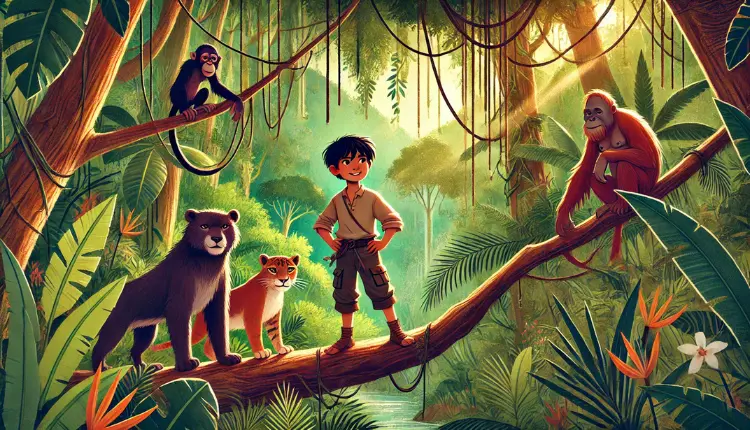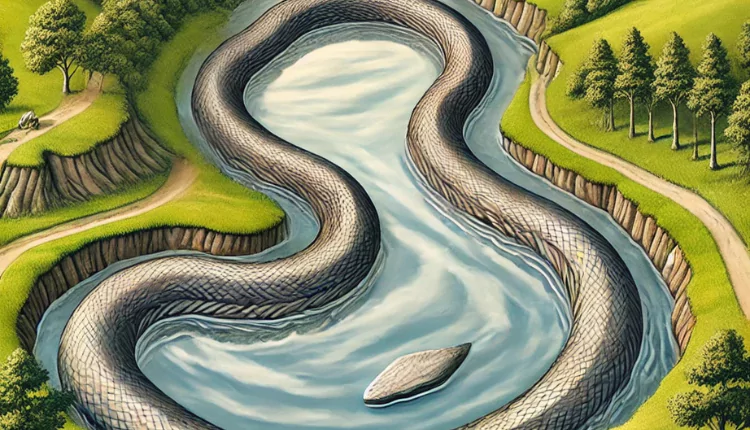It was in the heart of the Indian jungle, a place where the moonlight spilt through the tangled trees and the undergrowth whispered with life, that the tale of ‘Mowgli’ began.
He was just a tiny baby when the wolves found him. Soft and helpless, he was wrapped in the clothes of men but abandoned to the wild. Father Wolf was the first to see him, his yellow eyes narrowing as he approached the bundle. The boy’s skin was pale, and he cried out with a strange, thin sound that echoed through the leaves.
“A man-cub,” said Mother Wolf softly, padding closer, her tail sweeping the earth. “And hungry, too. Look at his little fists. He is not afraid.”
The baby looked up, unblinking, at the two great wolves. It was clear he had no fear, and that was the first sign of the boy’s future—a boy who would survive not by force or strength but by learning to belong to the jungle and being fearless.
However, not everyone welcomed Mowgli. For instance, the tiger Sher Khan, massive and striped like fire and shadow, had claimed the boy for himself.
“He is mine!” Sher Khan roared with his dangerous, deep voice echoing off the rocks. “Men are MY prey.”
But Mother Wolf stood tall, her fur bristling, “He is mine now,” she replied with her voice as steady as the roots of the jungle trees. “The man-cub will live; he will run with the pack and learn our ways.”
And so, it was decided. Mowgli was brought before the Council of Wolves, and there—under the full moon, with Baloo the bear speaking for him and Bagheera the black panther offering a kill as payment—Mowgli was accepted into the pack.
“You will need to learn, little brother,” said Bagheera that night, his dark coat melting into the shadows. “You are small, and the jungle is no easy teacher. It is fierce. But if you listen and watch, you will survive.”
Mowgli grew quickly, his limbs strong, his bare feet light against the forest floor. He ran with the wolf pack, and his laughter echoed through the air as he raced the cubs across clearings and through streams. Baloo, the great bear, took on the task of teaching him the Laws of the Jungle.
“The Law is the key to life here,” Baloo rumbled, swatting at bees as he spoke. “The jungle has its ways, and you must know them if you want to survive.”
Mowgli listened well. He learned the call of the birds and the warning of the deer; he also learned how to climb trees as nimbly as the monkeys and swim as silently as the fish. But most importantly, he learned ‘to watch’. Watching was survival, for the jungle was always moving, always shifting, and always hiding creatures.
The sleek and vigilant Bagheera would remind him, “A clever mind will serve you better than claws. Men have no fur, no fangs, no strength—but you have your wit.”
And Mowgli listened carefully.
Life in the jungle was not without peril, for Sher Khan’s threat loomed like thunderclouds over Mowgli’s days. The tiger was patient as he knew that the jungle itself often conspired against the unwary.
“I will have you, man-cub,” he growled whenever he crossed Mowgli’s path. “You do not belong here.”
But Mowgli did not run. Instead, he adapted.
He grew to know the jungle as no man ever had. For instance, he knew when the wind would shift with the lingering smell of danger, and he even knew what kind of danger was lurking just from the rustle of leaves. So he was certain if the danger was a python, a monkey, or something far worse that moved through the trees. It was as if the jungle whispered its secrets to him, and Mowgli had learned to speak its language.
When the Bandar-log, the mischievous monkeys, kidnapped him and dragged him to their city of ruins, Mowgli did not fight. Instead, he used his mind; he remembered the lessons of the jungle and called for help—howling the cries the wolves had taught him. Bagheera, Baloo, and Kaa, the python, came swiftly and rescued him from chaos.
“Why didn’t you fight them?” Baloo asked after.
“Because the Bandar-log are foolish,” Mowgli replied shrugging his shoulders. “Fighting fools only makes you a fool. Better to call those who can help.”
Bagheera nodded approvingly and swollen with pride, “You are learning, little one.”
It was in the dry season, when the riverbeds cracked open and the animals of the jungle came together at the Peace Rock for water, that Mowgli finally faced Sher Khan. The tiger had waited long enough.
“This is the man-cub’s end,” Sher Khan growled to the gathered animals. “He is no creature of the jungle. He does not belong.”
Mowgli stepped forward, small against the towering tiger, his dark hair falling across his brow. The wolves gathered behind him, unsure, but Mowgli’s voice was steady.
“I belong where I choose,” he said. “I have lived by the Laws of the Jungle. I have hunted when I was hungry, run when I was hunted, and helped those who needed me. What have you done, Sher Khan, but hunt for pleasure?”
The tiger snarled, lunging forward, but Mowgli was ready. He held up a burning branch, the fire flickering like a living thing in his hands. Sher Khan stopped short, the flames reflected in his wide eyes. That was Fire, the Red Flower, the one thing that the jungle feared, and Mowgli— for man-cub he was—wielded it with quiet confidence.
The animals watched in awe. Mowgli did not chase Sher Khan as the tiger slinked away into the shadows of the jungle.
“I have not conquered you,” he said softly to the forest. “I have only learned how to live with you.”
Mowgli’s days in the jungle were numbered after that, for he had decided to take the next step and learn to live in the other world, the one he came from. The wolves were still going to be his family, and the jungle had taught him everything he knew. But he was a man-cub after all.
On the big day, Bagheera walked beside him as he approached the edge of the forest.
“You have done well, little brother,” the panther said proudly. “You have lived as one of us yet remained yourself at the same time. It’s a quality not all possess.”
Mowgli looked back at the trees, “I will always carry the jungle with me,” he said. “Its laws, its dangers, and its lessons, I will not forget, ever.”
Bagheera nodded. “And remember, when you return, it will know you.”
Mowgli stepped beyond the jungle’s edge that day, out into a world that was larger still, but he left behind no footprints—only a memory that told of a boy who had learned to survive, not by fighting the jungle, but by adapting to it.
The jungle had shaped him, as it shapes all who listen to its ways. And though he was small in that vast, wild place, Mowgli had proven that real strength lies not in might but in the mind that watches, learns, and bends to the world it faces.
Looking for timeless fables that teach valuable life lessons?
Step into the enchanting world of moral-based Fables on Storyious, where each short story carries a deeper meaning. Our collection of classic fables and animal fables is designed to inspire and educate, making them perfect for young readers and adults alike. From tales of honesty and kindness to those of wisdom and perseverance, each story imparts an important message that lingers long after the last word. Whether you seek a heartwarming bedtime read or an engaging way to teach values, these short fables for kids are sure to leave a lasting impression. Explore now and uncover the wisdom hidden within every story!







Comments